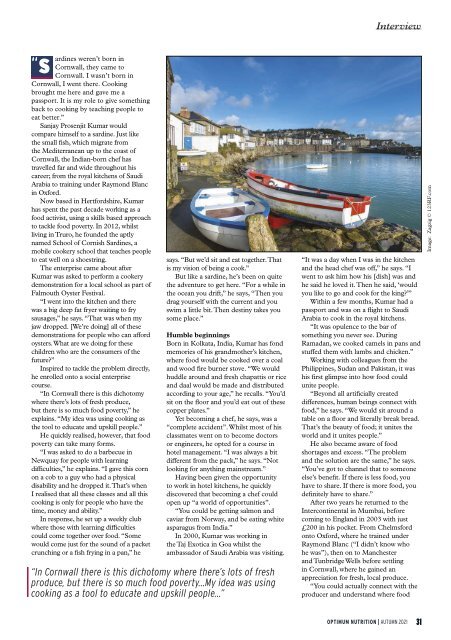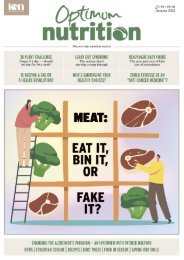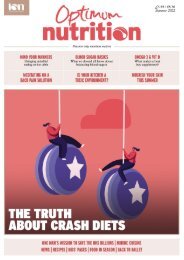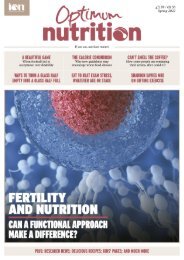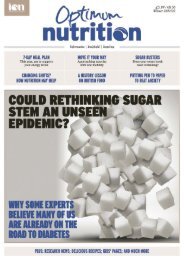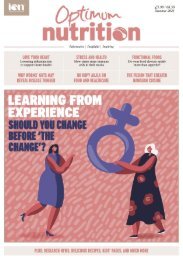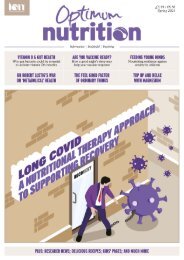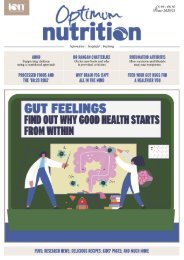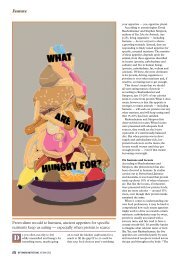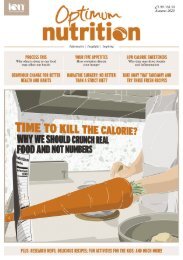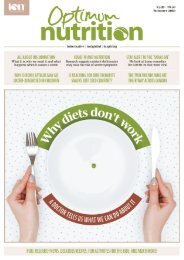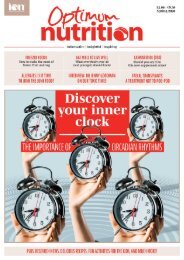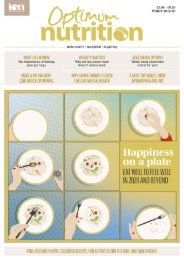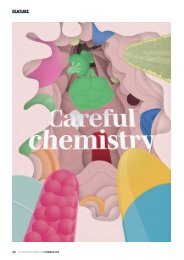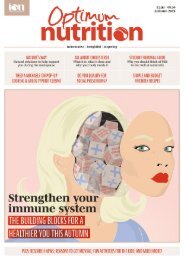Optimum Nutrition - Autumn 2021 - PREVIEW
A nutritional therapy approach to polycystic ovary syndrome (PCOS) | Community chef Sanjay Kumar on slow food, and how he’s working to eradicate food poverty | Recipes from the Ottolenghi Test Kitchen | A fresh look at the hygiene hypothesis | Food additives: is there a price for pretty products? | Your ultimate winter survival kit | Plus kids pages, research updates and more!
A nutritional therapy approach to polycystic ovary syndrome (PCOS) | Community chef Sanjay Kumar on slow food, and how he’s working to eradicate food poverty | Recipes from the Ottolenghi Test Kitchen | A fresh look at the hygiene hypothesis | Food additives: is there a price for pretty products? | Your ultimate winter survival kit | Plus kids pages, research updates and more!
- No tags were found...
You also want an ePaper? Increase the reach of your titles
YUMPU automatically turns print PDFs into web optimized ePapers that Google loves.
Interview<br />
S<br />
ardines weren’t born in<br />
“ Cornwall, they came to<br />
Cornwall. I wasn’t born in<br />
Cornwall, I went there. Cooking<br />
brought me here and gave me a<br />
passport. It is my role to give something<br />
back to cooking by teaching people to<br />
eat better.”<br />
Sanjay Prosenjit Kumar would<br />
compare himself to a sardine. Just like<br />
the small fish, which migrate from<br />
the Mediterranean up to the coast of<br />
Cornwall, the Indian-born chef has<br />
travelled far and wide throughout his<br />
career; from the royal kitchens of Saudi<br />
Arabia to training under Raymond Blanc<br />
in Oxford.<br />
Now based in Hertfordshire, Kumar<br />
has spent the past decade working as a<br />
food activist, using a skills based approach<br />
to tackle food poverty. In 2012, whilst<br />
living in Truro, he founded the aptly<br />
named School of Cornish Sardines, a<br />
mobile cookery school that teaches people<br />
to eat well on a shoestring.<br />
The enterprise came about after<br />
Kumar was asked to perform a cookery<br />
demonstration for a local school as part of<br />
Falmouth Oyster Festival.<br />
“I went into the kitchen and there<br />
was a big deep fat fryer waiting to fry<br />
sausages,” he says. “That was when my<br />
jaw dropped. [We’re doing] all of these<br />
demonstrations for people who can afford<br />
oysters. What are we doing for these<br />
children who are the consumers of the<br />
future?”<br />
Inspired to tackle the problem directly,<br />
he enrolled onto a social enterprise<br />
course.<br />
“In Cornwall there is this dichotomy<br />
where there’s lots of fresh produce,<br />
but there is so much food poverty,” he<br />
explains. “My idea was using cooking as<br />
the tool to educate and upskill people.”<br />
He quickly realised, however, that food<br />
poverty can take many forms.<br />
“I was asked to do a barbecue in<br />
Newquay for people with learning<br />
difficulties,” he explains. “I gave this corn<br />
on a cob to a guy who had a physical<br />
disability and he dropped it. That’s when<br />
I realised that all these classes and all this<br />
cooking is only for people who have the<br />
time, money and ability.”<br />
In response, he set up a weekly club<br />
where those with learning difficulties<br />
could come together over food. “Some<br />
would come just for the sound of a packet<br />
crunching or a fish frying in a pan,” he<br />
says. “But we’d sit and eat together. That<br />
is my vision of being a cook.”<br />
But like a sardine, he’s been on quite<br />
the adventure to get here. “For a while in<br />
the ocean you drift,” he says, “Then you<br />
drag yourself with the current and you<br />
swim a little bit. Then destiny takes you<br />
some place.”<br />
Humble beginnings<br />
Born in Kolkata, India, Kumar has fond<br />
memories of his grandmother’s kitchen,<br />
where food would be cooked over a coal<br />
and wood fire burner stove. “We would<br />
huddle around and fresh chapattis or rice<br />
and daal would be made and distributed<br />
according to your age,” he recalls. “You’d<br />
sit on the floor and you’d eat out of these<br />
copper plates.”<br />
Yet becoming a chef, he says, was a<br />
“complete accident”. Whilst most of his<br />
classmates went on to become doctors<br />
or engineers, he opted for a course in<br />
hotel management. “I was always a bit<br />
different from the pack,” he says. “Not<br />
looking for anything mainstream.”<br />
Having been given the opportunity<br />
to work in hotel kitchens, he quickly<br />
discovered that becoming a chef could<br />
open up “a world of opportunities”.<br />
“You could be getting salmon and<br />
caviar from Norway, and be eating white<br />
asparagus from India.”<br />
In 2000, Kumar was working in<br />
the Taj Exotica in Goa whilst the<br />
ambassador of Saudi Arabia was visiting.<br />
“In Cornwall there is this dichotomy where there’s lots of fresh<br />
produce, but there is so much food poverty...My idea was using<br />
cooking as a tool to educate and upskill people...”<br />
“It was a day when I was in the kitchen<br />
and the head chef was off,” he says. “I<br />
went to ask him how his [dish] was and<br />
he said he loved it. Then he said, ‘would<br />
you like to go and cook for the king?’”<br />
Within a few months, Kumar had a<br />
passport and was on a flight to Saudi<br />
Arabia to cook in the royal kitchens.<br />
“It was opulence to the bar of<br />
something you never see. During<br />
Ramadan, we cooked camels in pans and<br />
stuffed them with lambs and chicken.”<br />
Working with colleagues from the<br />
Philippines, Sudan and Pakistan, it was<br />
his first glimpse into how food could<br />
unite people.<br />
“Beyond all artificially created<br />
differences, human beings connect with<br />
food,” he says. “We would sit around a<br />
table on a floor and literally break bread.<br />
That’s the beauty of food; it unites the<br />
world and it unites people.”<br />
He also became aware of food<br />
shortages and excess. “The problem<br />
and the solution are the same,” he says.<br />
“You’ve got to channel that to someone<br />
else’s benefit. If there is less food, you<br />
have to share. If there is more food, you<br />
definitely have to share.”<br />
After two years he returned to the<br />
Intercontinental in Mumbai, before<br />
coming to England in 2003 with just<br />
£200 in his pocket. From Chelmsford<br />
onto Oxford, where he trained under<br />
Raymond Blanc (“I didn’t know who<br />
he was”), then on to Manchester<br />
and Tunbridge Wells before settling<br />
in Cornwall, where he gained an<br />
appreciation for fresh, local produce.<br />
“You could actually connect with the<br />
producer and understand where food<br />
Image: Zagzig © 123RF.com<br />
OPTIMUM NUTRITION | AUTUMN <strong>2021</strong><br />
31


